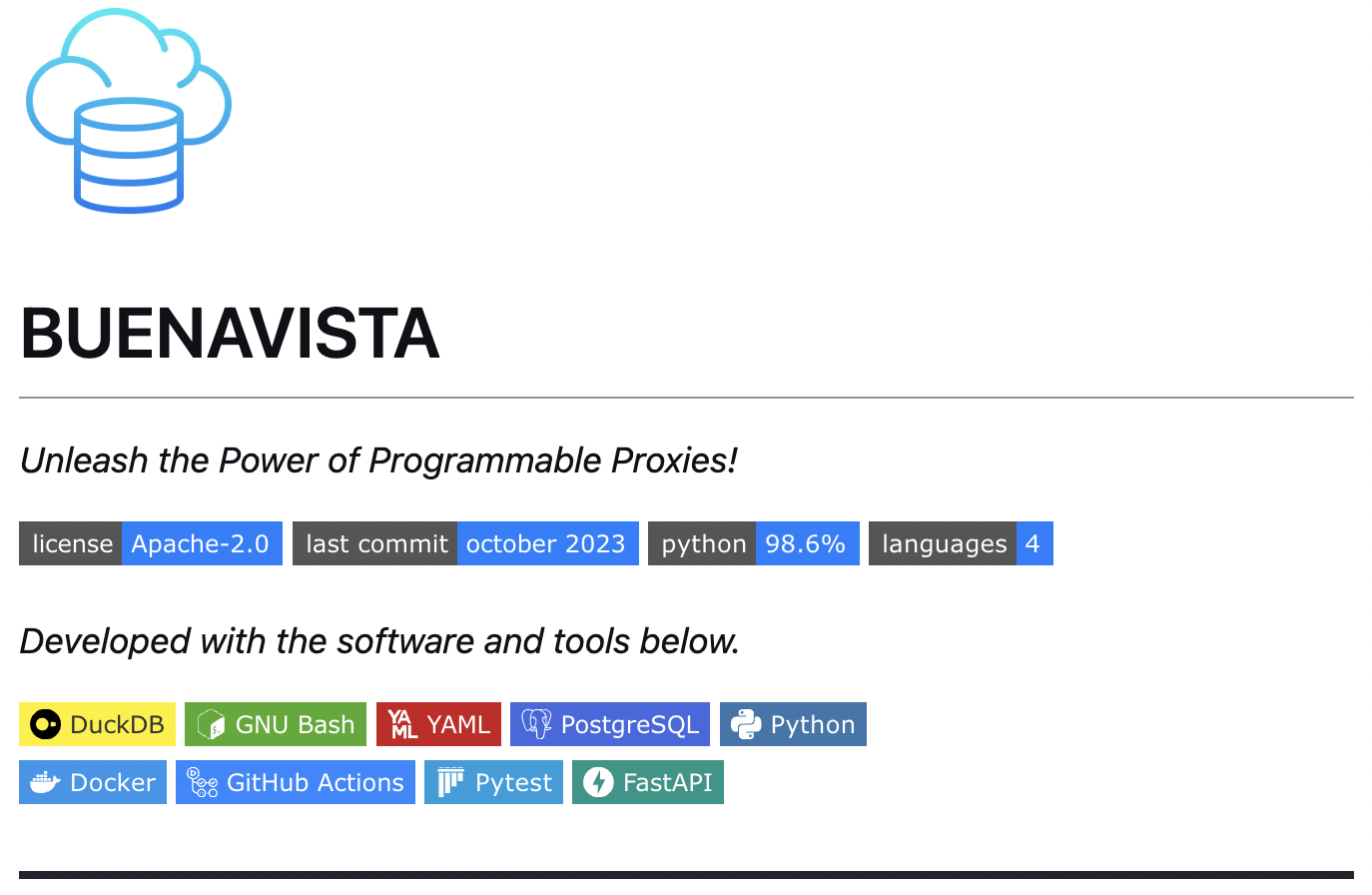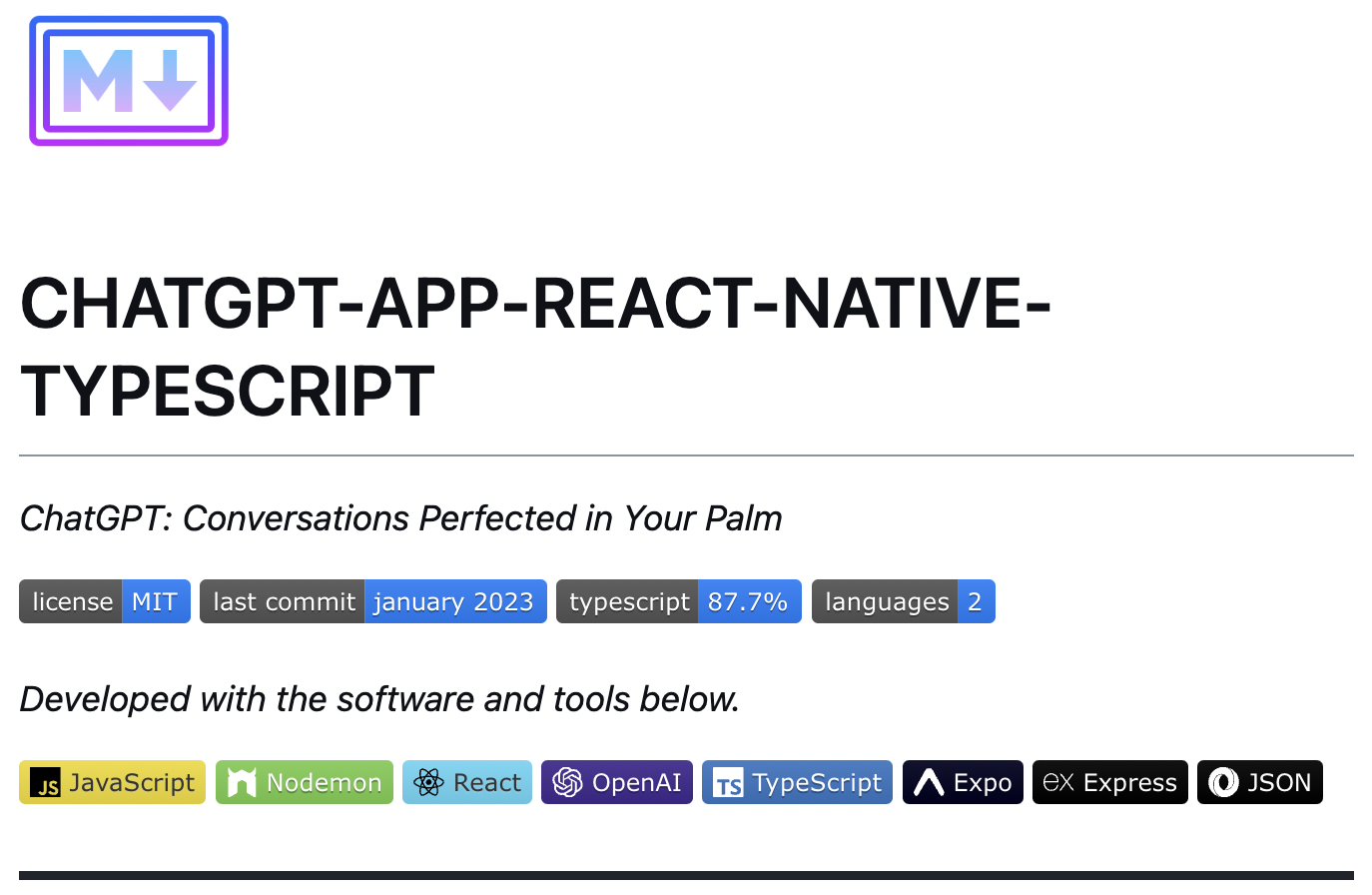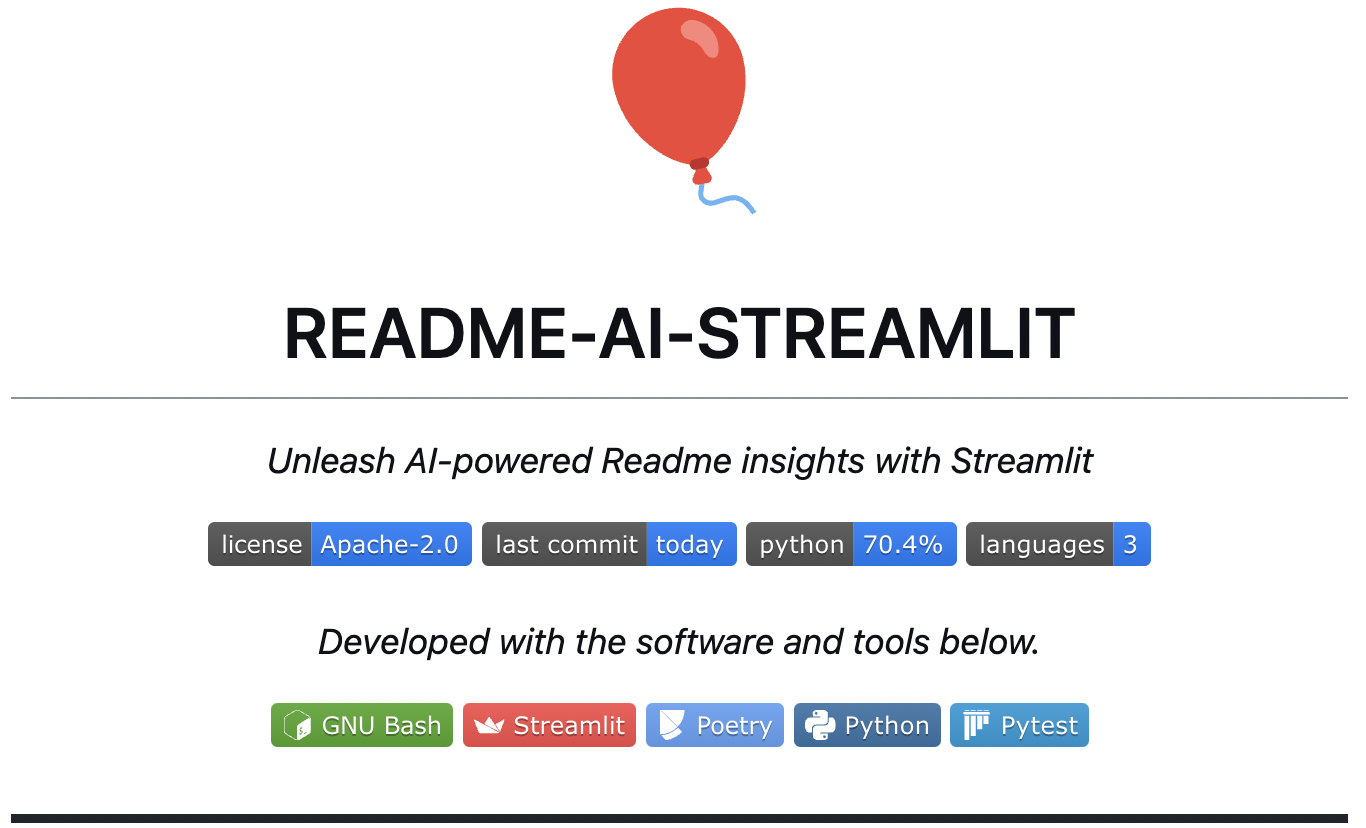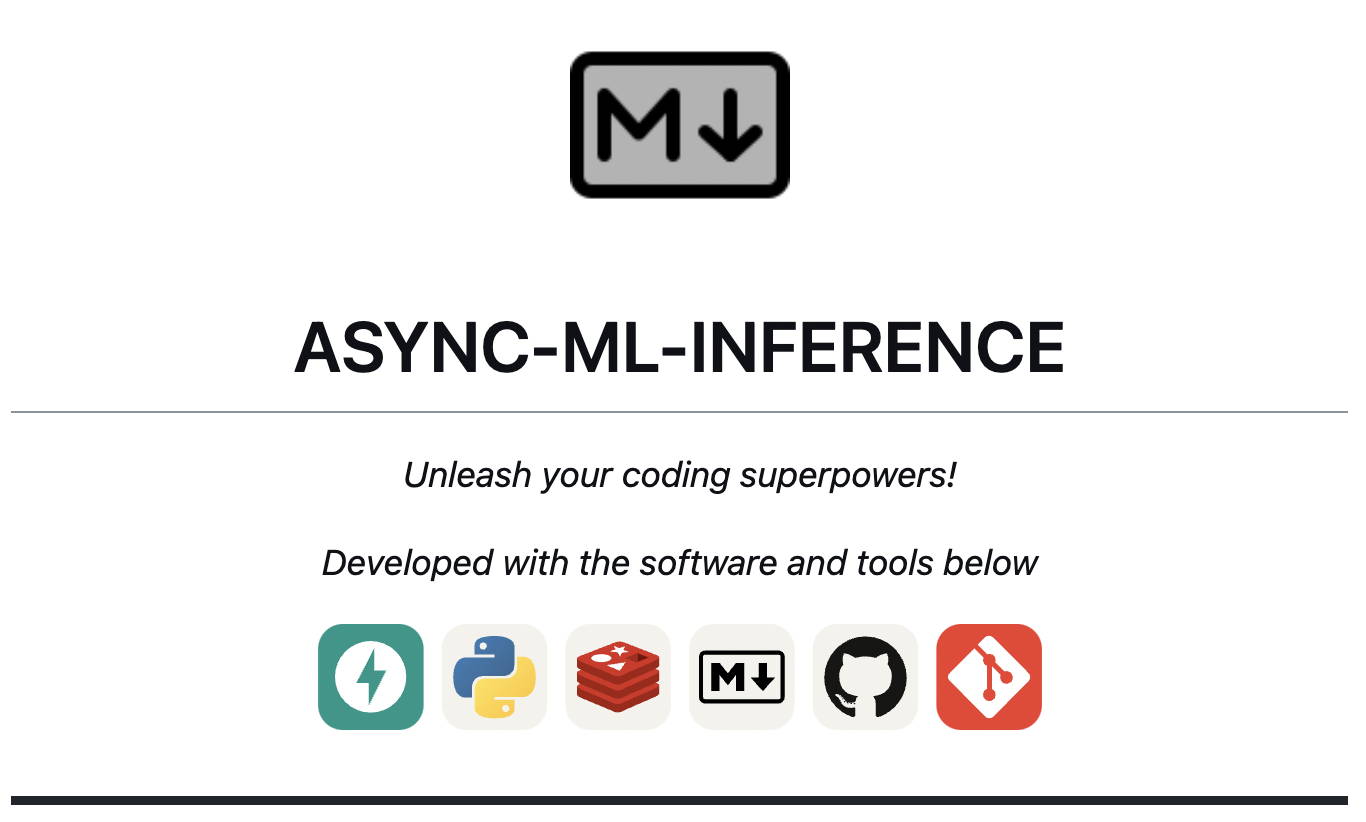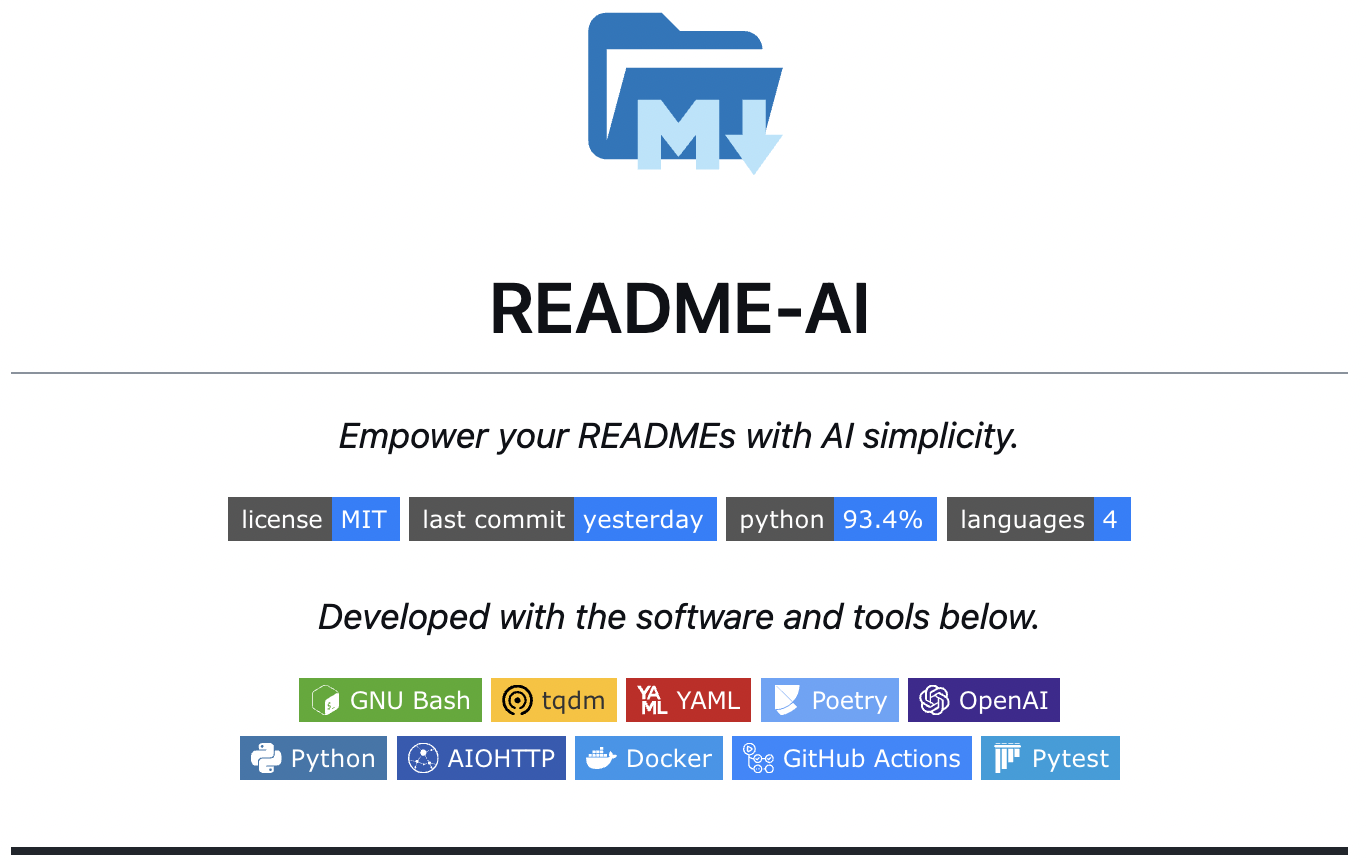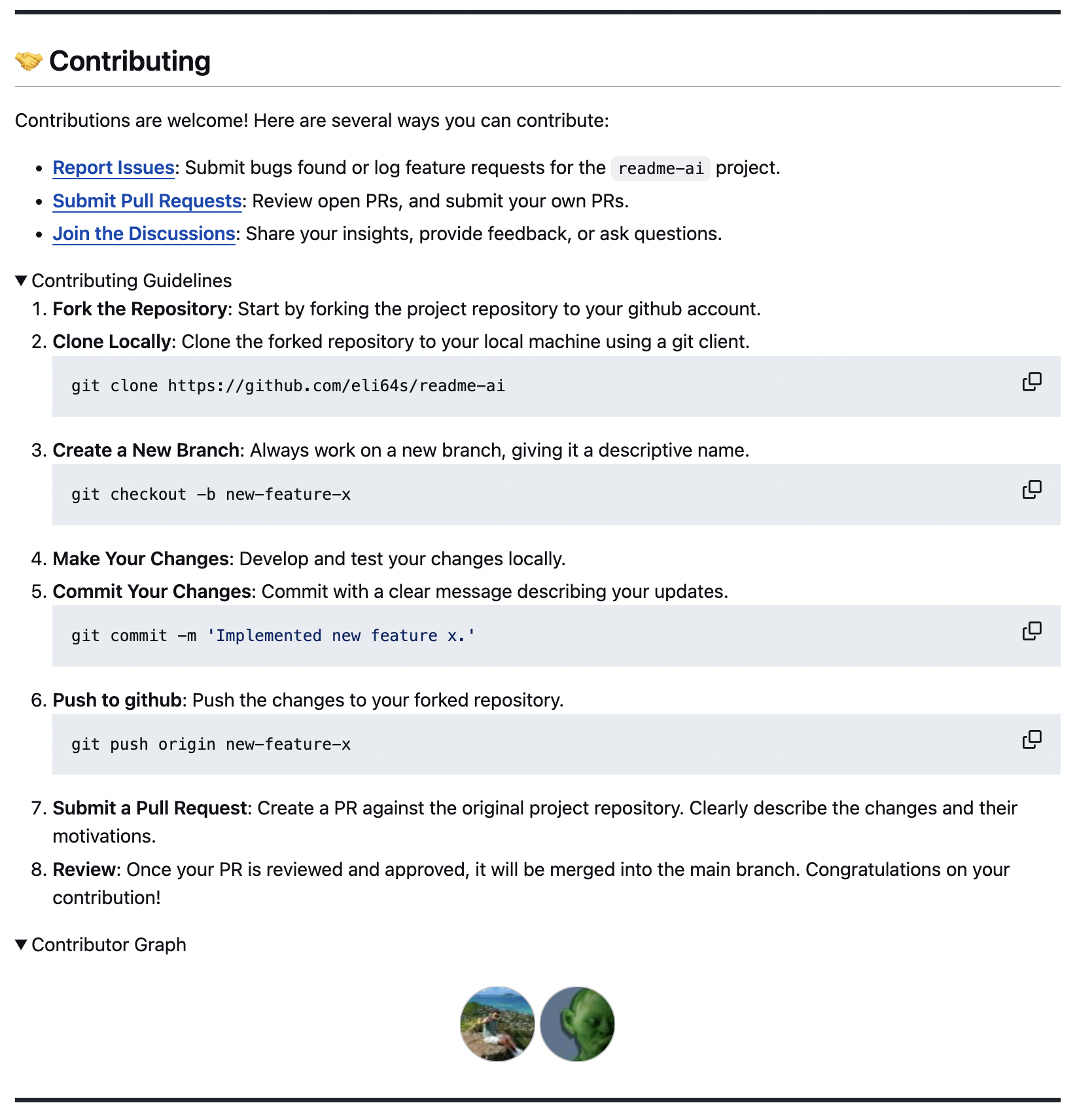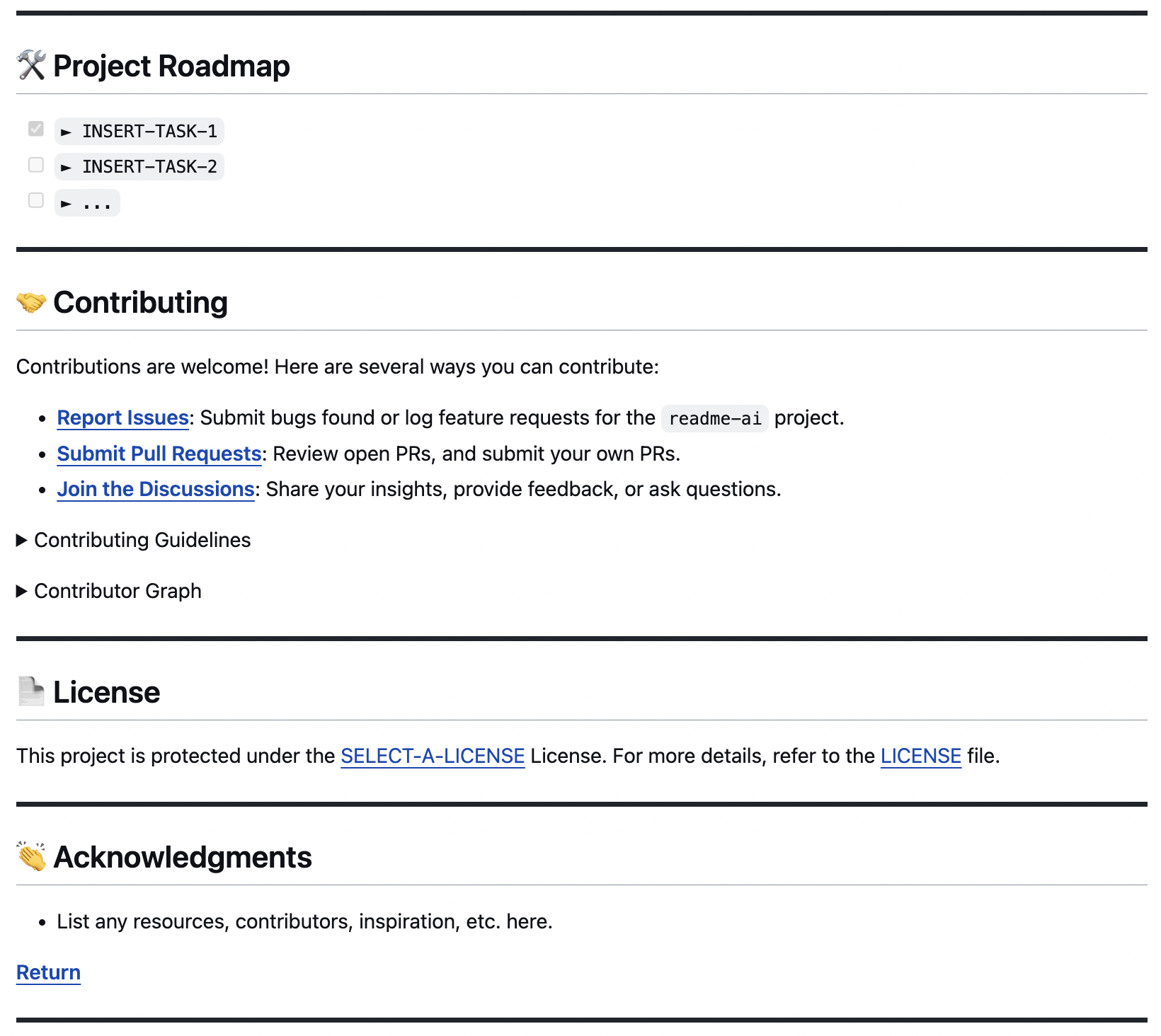Automated README file generator, powered by large language model APIs
Table of Contents
Objective
Readme-ai is a developer tool that auto-generates README.md files using a combination of data extraction and generative ai. Simply provide a repository URL or local path to your codebase and a well-structured and detailed README file will be generated for you.
Motivation
Streamlines documentation creation and maintenance, enhancing developer productivity. This project aims to enable all skill levels, across all domains, to better understand, use, and contribute to open-source software.
Important
Readme-ai is currently under development with an opinionated configuration and setup. It is vital to review all generated text from the LLM API to ensure it accurately represents your project.
Standard CLI Usage:
readmeai-cli-demo.mov
Offline Mode Demonstration:
readmeai-streamlit-demo.mov
Tip
Offline mode is useful for generating a boilerplate README at no cost. View the offline README.md example here!
Readme-ai uses a balanced approach to building README files, combining data extraction and generative AI to create comprehensive and informative documentation.
- Data Extraction & Analysis: File parsers and analyzers are used to extract project metadata, dependencies, and other relevant details. This data is used to both populate many sections of the README, as well as provide context to the LLM API.
- Generative Content: For more abstract or creative sections, readme-ai uses LLM APIs to generate content that is both informative and engaging. This includes sections such as a project slogan, overview, features table, and file summaries.
Over a dozen CLI options are available to customize the README generation process:
- LLM Options: Run the tool with OpenAI, Ollama, Google Gemini, or in offline mode.
- Offline Mode: Generate a README without making API calls. Readme-ai is still able to populate a significant portion of the README using metadata collected during preprocessing.
- Project Badges: Choose from an array of badge styles, colors, and alignments.
- Project Logo: Select from the default set, upload your own, or let the LLM give it a try!
A few examples of the CLI options in action:
See the Configuration section for a complete list of CLI options.
👋 Overview
| Overview
|
 |
🧩 Features
| Features Table
|
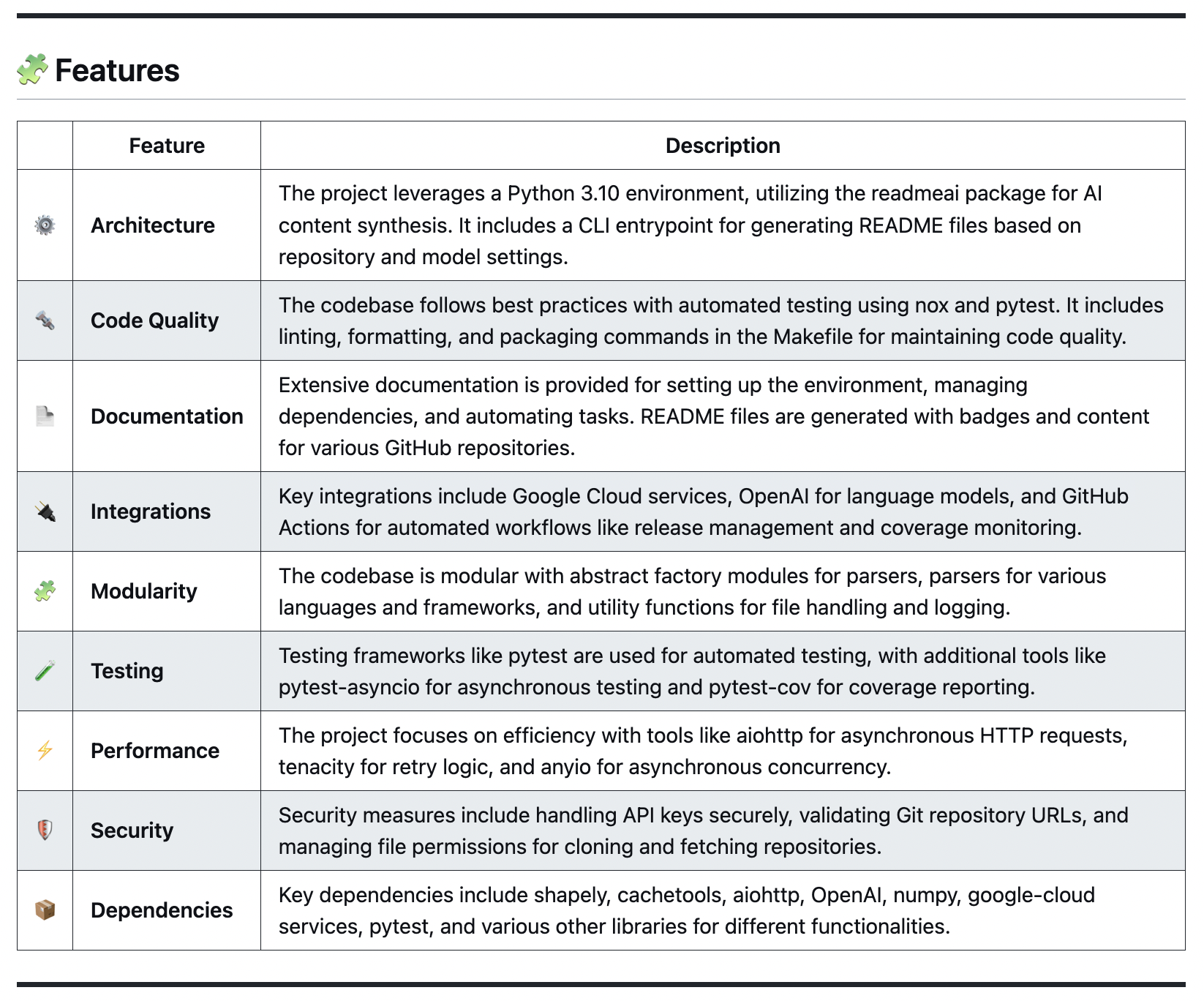 |
📄 Codebase Documentation
| Repository Structure
|
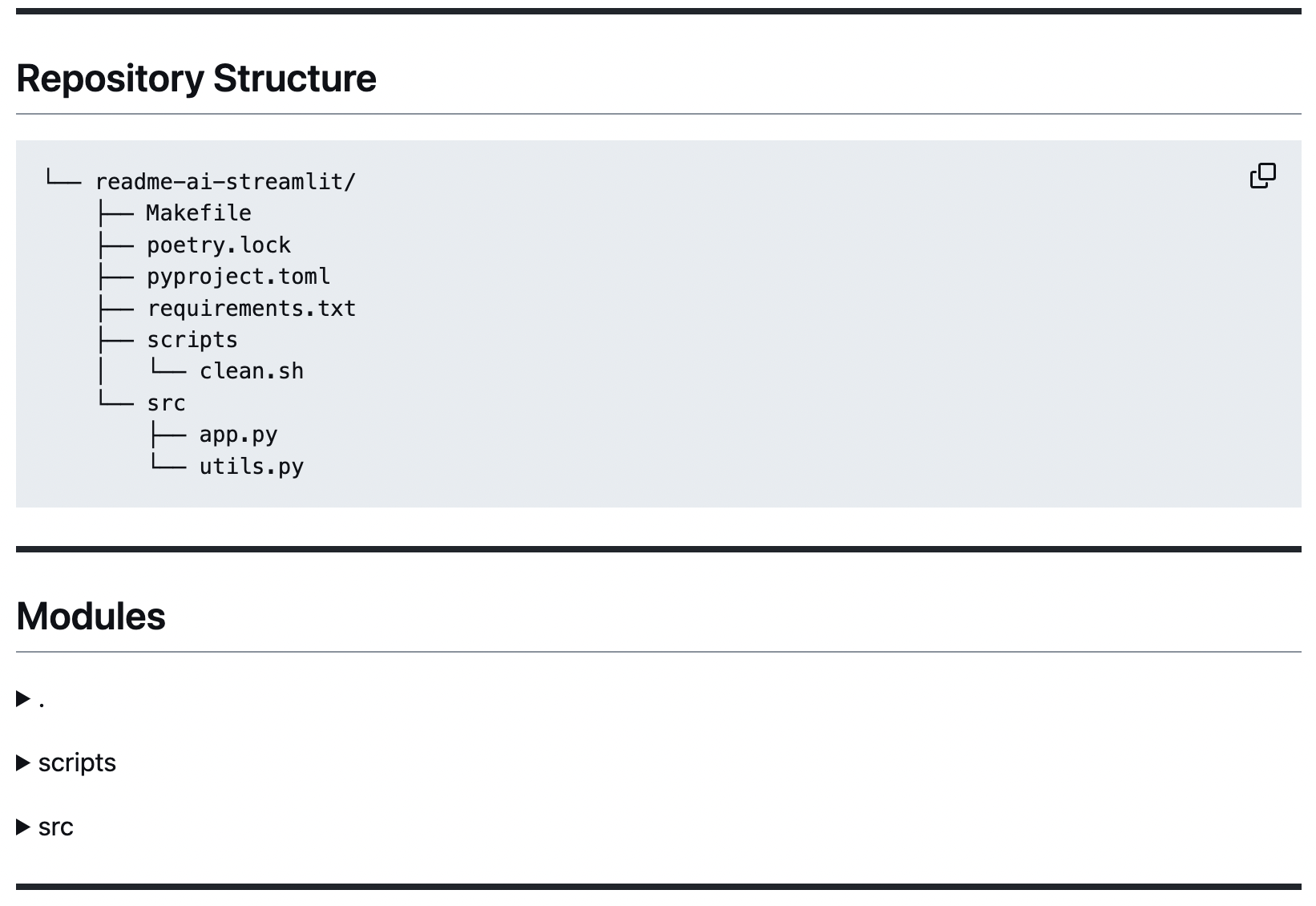
|
|
File Summaries
|
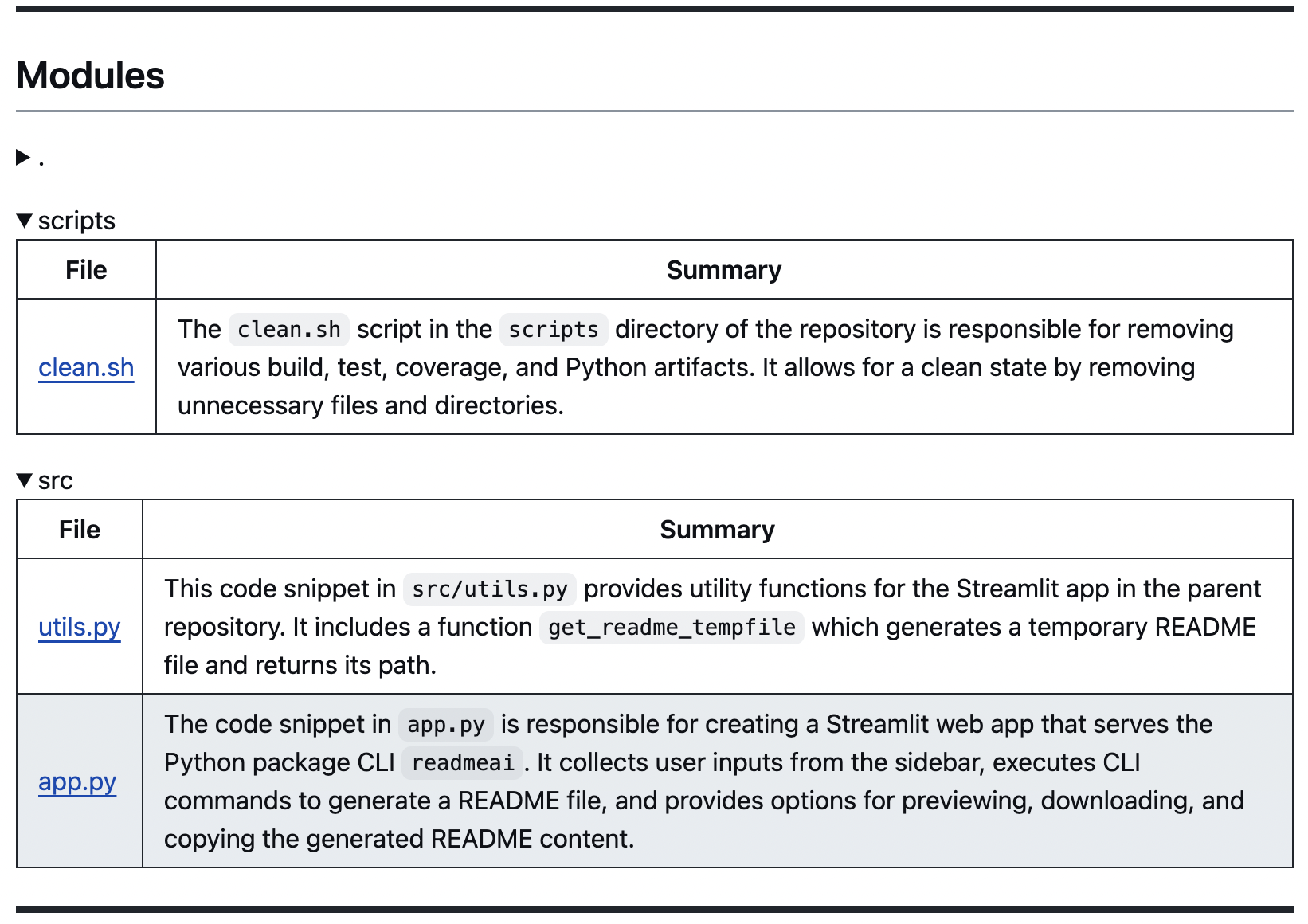
|
🚀 Quickstart Commands
| Getting Started
Install, Usage, and Test guides are supported for many languages.
|
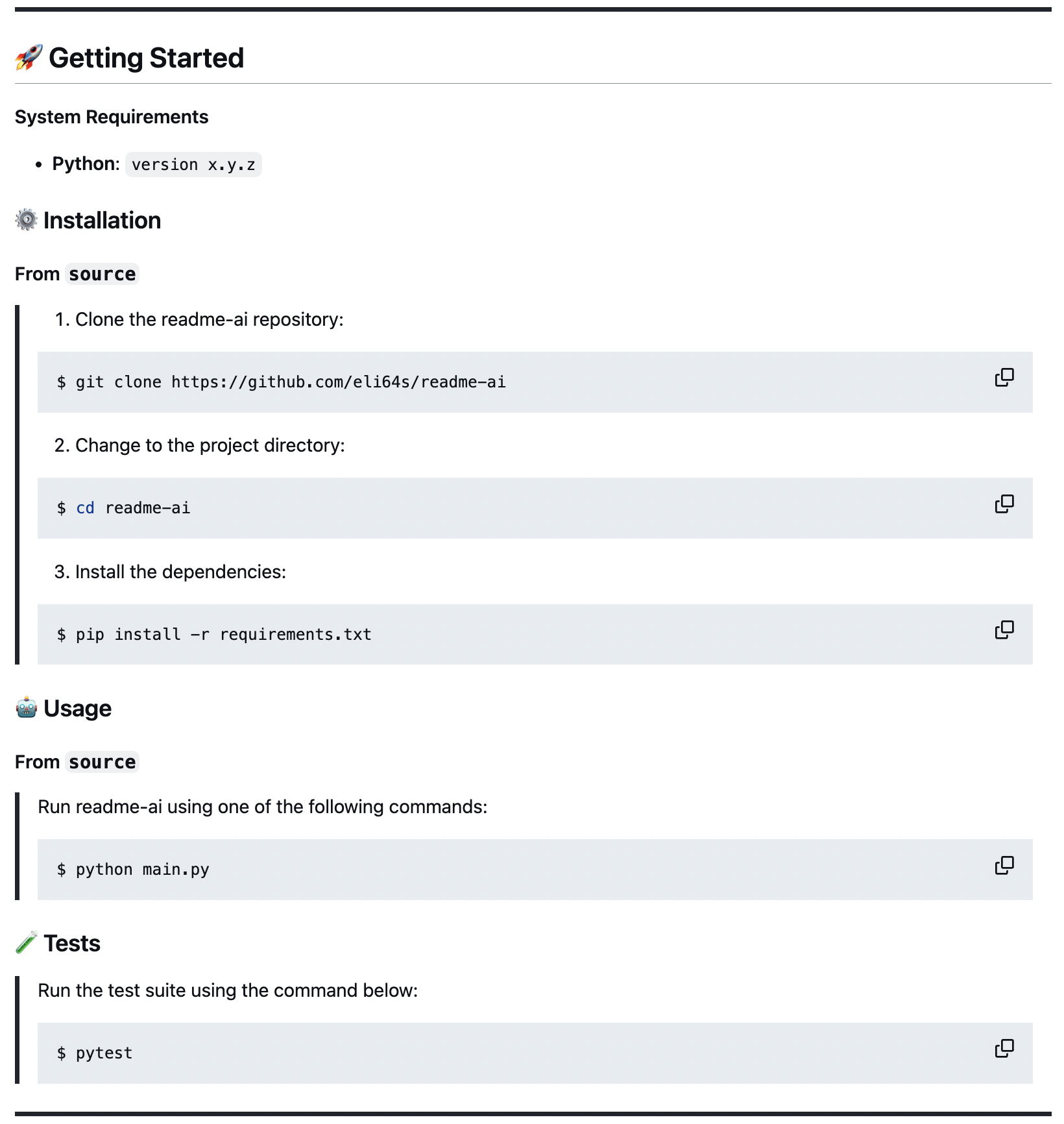
|
🔰 Contributing Guidelines
🎨 Templates (wip)
| README Template for ML & Data
|
|
| Output File | Input Repository | Input Contents | |
|---|---|---|---|
| ▹ | readme-python.md | readme-ai | Python |
| ▹ | readme-google-gemini.md | readme-ai | Python |
| ▹ | readme-typescript.md | chatgpt-app-react-ts | TypeScript, React |
| ▹ | readme-postgres.md | postgres-proxy-server | Postgres, Duckdb |
| ▹ | readme-kotlin.md | file.io-android-client | Kotlin, Android |
| ▹ | readme-streamlit.md | readme-ai-streamlit | Python, Streamlit |
| ▹ | readme-rust-c.md | rust-c-app | C, Rust |
| ▹ | readme-go.md | go-docker-app | Go |
| ▹ | readme-java.md | java-minimal-todo | Java |
| ▹ | readme-fastapi-redis.md | async-ml-inference | FastAPI, Redis |
| ▹ | readme-mlops.md | mlops-course | Python, Jupyter |
| ▹ | readme-local.md | Local Directory | Flink, Python |
System Requirements:
- Python 3.9+
- Package manager/Container:
pip,pipx,docker - LLM service:
OpenAI,Ollama,Google Gemini,Offline Mode
Repository URL or Local Path:
Make sure to have a repository URL or local directory path ready for the CLI.
Choosing an LLM Service:
- OpenAI: Recommended, requires an account setup and API key.
- Ollama: Free and open-source, potentially slower and more resource-intensive.
- Google Gemini: Requires a Google Cloud account and API key.
- Offline Mode: Generates a boilerplate README without making API calls.
pip install readmeai
Tip
Use pipx to install and run Python command-line applications without causing dependency conflicts with other packages!
docker pull zeroxeli/readme-ai:latest
conda install -c conda-forge readmeai
Clone and Install
Clone repository and change directory.
$ git clone https://github.com/eli64s/readme-ai $ cd readme-ai
$ bash setup/setup.sh
$ poetry install
- Similiary you can use
pipenvorpipto install the requirements.txt.
Environment Variables
Set your OpenAI API key as an environment variable.
# Using Linux or macOS $ export OPENAI_API_KEY=<your_api_key> # Using Windows $ set OPENAI_API_KEY=<your_api_key>
Set Ollama local host as an environment variable.
$ export OLLAMA_HOST=127.0.0.1 $ ollama pull mistral:latest # llama2, etc. $ ollama serve # run if not using the Ollama desktop appFor more details, check out the Ollama repository.
Set your Google Cloud project ID and location as environment variables.
$ export GOOGLE_API_KEY=<your_api_key>
Run the CLI
# Using OpenAI API readmeai --repository https://github.com/eli64s/readme-ai --api openai # Using Ollama local model readmeai --repository https://github.com/eli64s/readme-ai --api ollama --model mistral
docker run -it \ -e OPENAI_API_KEY=$OPENAI_API_KEY \ -v "$(pwd)":/app zeroxeli/readme-ai:latest \ -r https://github.com/eli64s/readme-ai
Try directly in your browser on Streamlit, no installation required! For more details, check out the readme-ai-streamlit repository.
Usage
$ conda activate readmeai $ python3 -m readmeai.cli.main -r https://github.com/eli64s/readme-ai
$ poetry shell $ poetry run python3 -m readmeai.cli.main -r https://github.com/eli64s/readme-ai
$ make pytest
$ nox -f noxfile.py
Tip
Use nox to test application against multiple Python environments and dependencies!
Customize the README file using the CLI options below.
| Option | Type | Description | Default Value |
|---|---|---|---|
--alignment, -a |
String | Align the text in the README.md file's header. | center |
--api |
String | LLM API service to use for text generation. | offline |
--badge-color |
String | Badge color name or hex code. | 0080ff |
--badge-style |
String | Badge icon style type. | see below |
--base-url |
String | Base URL for the repository. | v1/chat/completions |
--context-window |
Integer | Maximum context window of the LLM API. | 3999 |
--emojis, -e |
Boolean | Adds emojis to the README.md file's header sections. | False |
--image, -i |
String | Project logo image displayed in the README file header. | blue |
🚧 --language |
String | Language for generating the README.md file. | en |
--model, -m |
String | LLM API to use for text generation. | gpt-3.5-turbo |
--output, -o |
String | Output file name for the README file. | readme-ai.md |
--rate-limit |
Integer | Maximum number of API requests per minute. | 5 |
--repository, -r |
String | Repository URL or local directory path. | None |
--temperature, -t |
Float | Sets the creativity level for content generation. | 0.9 |
🚧 --template |
String | README template style. | default |
--top-p |
Float | Sets the probability of the top-p sampling method. | 0.9 |
--tree-depth |
Integer | Maximum depth of the directory tree structure. | 2 |
--help |
Displays help information about the command and its options. |
🚧 feature under development
The --badge-style option lets you select the style of the default badge set.
| Style | Preview |
|---|---|
| default |     |
| flat |  |
| flat-square |  |
| for-the-badge |  |
| plastic |  |
| skills | |
| skills-light | |
| social |  |
When providing the --badge-style option, readme-ai does two things:
- Formats the default badge set to match the selection (i.e. flat, flat-square, etc.).
- Generates an additional badge set representing your projects dependencies and tech stack (i.e. Python, Docker, etc.)
$ readmeai --badge-style flat-square --repository https://github.com/eli64s/readme-ai
{... project logo ...}
{... project name ...}
{...project slogan...}




Developed with the software and tools below.











{... end of header ...}
Select a project logo using the --image option.
| blue | gradient | black |
| cloud | purple | grey |
For custom images, see the following options:
- Use
--image customto invoke a prompt to upload a local image file path or URL. - Use
--image llmto generate a project logo using a LLM API (OpenAI only).
- Add new CLI options to enhance README file customization.
-
--apiIntegrate singular interface for all LLM APIs (OpenAI, Ollama, Gemini, etc.) -
--auditto review existing README files and suggest improvements. -
--templateto select a README template style (i.e. ai, data, web, etc.) -
--languageto generate README files in any language (i.e. zh-CN, ES, FR, JA, KO, RU)
-
- Develop robust documentation generator to build full project docs (i.e. Sphinx, MkDocs)
- Create community-driven templates for README files and gallery of readme-ai examples.
- GitHub Actions script to automatically update README file content on repository push.
To grow the project, we need your help! See the links below to get started.






